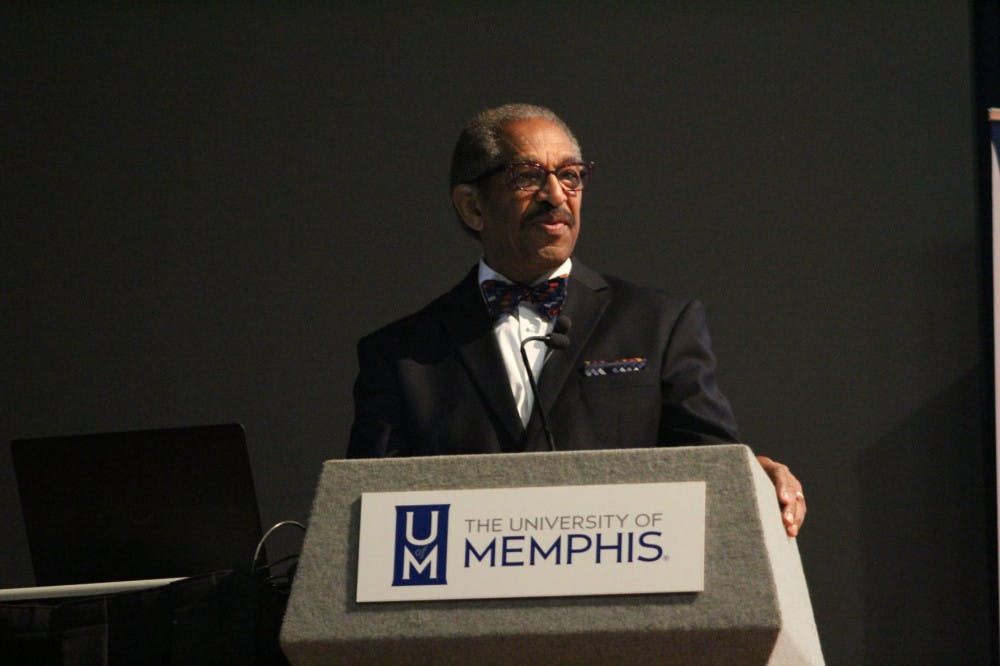
Benjamin Reese, Jr. talked to members of the University of Memphis community last week about his research on implicit bias. Reese explained that implicit bias can sometimes form harful stereotypes or prejudice.
Vice president for the office of institutional equity and chief diversity officer at Duke University Benjamin Reese, Jr. talked to members of the University of Memphis community last week about his research on implicit bias.Â
Reese defines implicit bias as the identification of images and information that form people’s sometimes-unconscious ideas of others, i.e. what people read, see on television and the Internet and what they know from their their cultural backgrounds. Through these sometimes unconscious ideas, people can create harmful stereotypes and prejudice. Â
Implicit bias is a topic Reese has spent the majority from his life studying. A native from New York, Reese focused most of his time in secondary education on the Civil Rights Movement. He said he remembers growing up in an economically disadvantaged household.
“(I had) parents who were deeply committed to higher education, but they didn’t really know what that was,†Reese said. “But they drilled into my head I had to go to college.â€
Upon graduation from high school, he said he remembers being denied admission to multiple schools of his choice despite testing in a high percentile on an IQ test. Left with few options, he decided to enroll as a non-matriculated student, or a student who has not been accepted to a four-year college, at Bronx Community College. He credits what, at the time, was a tuition-free City University of New York system as “critical to me starting my college education.†Disapproving of the legislature, he gathered a group of collegiate friends and protested in front of then New York Gov. Nelson Rockefeller’s office in efforts to stop the legislation. Despite protesting for three days, the legislation was approved.
“... Although we didn’t start the conversation in New York City around access to higher education, I like to think in some small way we got a lot of press coverage and we sort of added to or augmented the conversation about access to higher education, particularly for students and families that were economically challenged,†Reese said.Â
Over the decades, Reese said the values he established in his adolescence are ones he has carried through his adulthood and research. His passion has led him to discuss topics of access to higher education, equity, social justice and fairness on Congressional committees. Today, he continues to research implicit bias and how it affects our behavior, and he trains security officials and law enforcement about it.Â
His work has been added to Anthony Greenwald and Mahzarion Banaji, who developed the Implicit Association test. This test helps people discover their implicit biases. IAT measures attitudes and beliefs that people may be unwilling or unable to report. The IAT shows people if they have an implicit attitude they did not know about. Examples of implicit bias can be the correlation of laziness with obesity, appraisal of baseball cards based on race, or the association of personality traits based upon gender or sexuality.
Reese’s lecture and workshop encouraged people to identify their own biases. He welcomes finding different kinds of people and working to better understand cultures and lifestyles. Reese said even upon his arrival at Duke, he saw signs of implicit bias.
“When I first came to Duke 22 years ago, I was hiring a director of diversity, so I looked at the job description and it gave preference really to people who had been in higher education, only certain kinds of institutions, had certain kinds of experiences,†Reese said.Â
Ultimately, Reese said he wants people to become aware of what biases they have and making sure these prejudices do not affect social interactions. In closing, dean and professor at the Loewenberg College of Nursing Lin Zhan made remarks about Reese.
“Diversity inclusion is something we want to make a reality for nurses,†Zhan said. “Diversity and inclusion is essential for the humanities and in taking care of patients.â€Â






